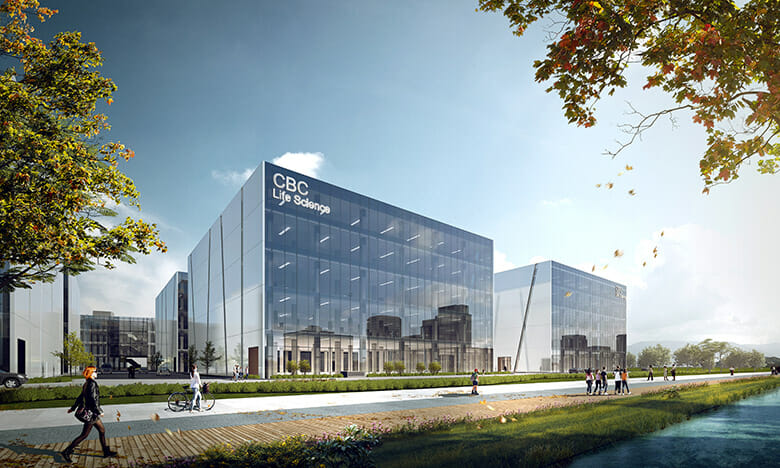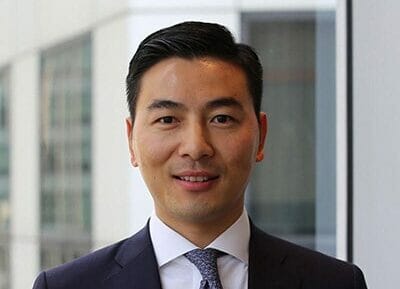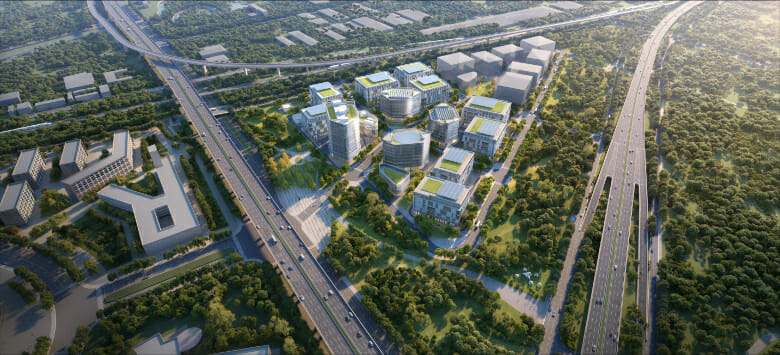
A the life science park is planned to include more than 10 facilities (CBC HIP)
A joint venture between Dutch pension fund manager APG Asset Management and Singapore healthcare-focused private equity firm CBC Group has made its third investment within four months by picking up an industrial site in western Shanghai’s Qingpu district.
CBC Healthcare Infrastructure Platform (CBC HIP) has acquired 55,840 square metres (601,057 square feet) within the Life Science Zone of the Qingpu Industrial Park, according to representatives of the joint venture, with plans to develop the site into a life science park spanning more than 110,000 square metres of gross floor area.
The dedicated healthcare platform plans to invest a total of RMB 980 million ($137 million) including land costs to develop eight manufacturing facilities and two R&D office buildings as well as other ancillary facilities on the site, the representatives said.
The project aims to leverage growing demand from companies engaged in pharmaceuticals, medical devices and other life science disciplines in China’s commercial capital.
“The Life Science Zone of the Qingpu Industrial Park is strategically located at the center of the Yangtze River Delta Economic Zone, and our development will provide well-designed, user-friendly and high-quality R&D and manufacturing facilities to empower and accelerate our life science partners’ growth in China,” said Hans Kang, chief executive of CBC HIP.
Growing Mainland Portfolio
Planning to complete the project in the second quarter of 2024, CBC HIP acquired the site in a government auction on 12 October for RMB 129 million ($17.8 million), according to Shanghai’s official land transaction website.

Hans Kang, CEO of CBC HIP
The site purchased by CBC HIP comes with a 50 year tenure and has already received the environmental impact assessment permit needed for life science R&D and manufacturing activities.
The project forms part of a planned 3.65 square kilometre (1.4 square mile) life science zone within the Qingpu Industrial Park, with the district emerging as a hub focusing on innovative medicine, clinical nutrition, aesthetic diagnostics and advanced medical devices.
Alzheimer’s disease drug maker Green Valley Pharmaceuticals, antiserum and antitoxin product provider Shanghai Serum Bio-technology Co Ltd, and Zhonghua Pharma, a maker of the Dragon & Tiger brand pain-relieving balm, have already set up development bases in the area.
CBC HIP said Qingpu’s proximity to life science clusters in Shanghai’s Zhangjiang High Tech Park and Suzhou’s BioBay provide it with access to established pools of talent and clinical trial resources as well as business opportunities. Zhangjiang and Suzhou are each about a one-hour drive from Qingpu.
The western Shanghai purchase comes around two months after CBC HIP bought two life science assets in Beijing, acquiring an 80 percent stake in a sprawling life science campus in the Chinese capital’s Daxing district and a land parcel in Zhongguancun Life Science Park.
All three investments were made by China Life Science Infrastructure Venture (CLSIV), a fund in which APG invested $400 million and CBC contributed another $100 million in its first closing last November.
CBC HIP said it has so far acquired approximately 410,000 square metres of life science real assets in Beijing and Shanghai, and continues to build up its portfolio.
Kang told Mingtiandi in August that the firm’s CLSIV vehicle was on track to reach its hard cap of $1.5 billion by the first quarter of 2023 amid strong reception from global investors, including sovereign and pension funds.
Healthy Interest
China’s life science industry has grown rapidly in recent years with the country almost doubling its share of the world’s top 1,000 pharmaceutical companies by total valuation to 12 percent in 2021, from 6.5 percent in 2015, according to investment bank Torreya.

A rendering of CBC’s 178,000 square metre development in Beijing’s Changping district (Source: CBC)
With the industry’s rapid growth and the rental premium commanded by life science facilities, the sector has gained attention from institutional investors as traditional favourites like office assets provide narrowing returns..
“Life sciences tend to have higher yields than other asset classes, limited supply with relevant EIA licensing, stickier tenants, higher affordability, and government support for the industry. Tenants, however, do have higher expectations in terms of build quality, and supporting amenities and resources,” James Macdonald, head of Savills research for China, told Mingtiandi.
DNE Group and ESR, both backed by Warburg Pincus, have also turned their eyes on life sciences.
In April of this year, DNE Group announced a joint venture with a global institutional investor to pursue opportunities in life science parks located in top-tier cities in China, with an expected total investment of $1.2 billion. The seed project of the JV is a park owned and operated by DNE at Shanghai’s Zhangjiang Science City cluster.
In July, ESR acquired a business park in Zhangjiang Pharma Valley, close to Zhangjiang Science City, marking the industrial specialist’s first-ever life sciences buy.
Leave a Reply